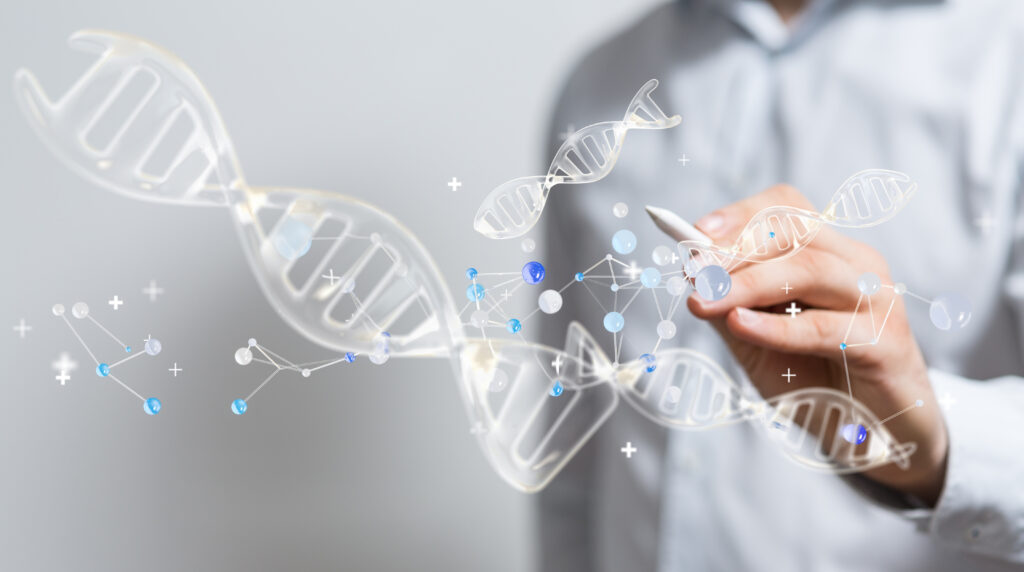By Janet Kieslich
SUN JAN 7, 2024

What is Nutrigenomic DNA Testing and Why Should I Consider Doing?
Janet Kieslich, FNP is one of our nurse practitioners that is listed on our Patient Advocate Match Directory of Health Care Services. She shares one of her areas of expertise in this guest blog post today. DNA for Health Testing.
Are you curious if you should be on fish oil, vitamin D, B complex? Do you really know if you get enough B vitamins or folate in your diet? Do you know that you may carry certain genetic variations that may alter the way you repair your DNA which may increase your risk for certain diseases, cancers, etc.? Do you want to know more about your personal make up as it relates to lipid metabolism, methylation and DNA repair processes, inflammation, oxidative stress, detoxification, food sensitivities, vitamin metabolism, insulin sensitivity and function?
I would suggest that you do.
Read on to see if personalized medicine and understanding your modifiable genetic variations is something you want to pursue…I can certainly help you! Partnering with someone you trust and a product well researched and supported is KEY!
Let’s get started. I apologize in advance if I get a little scientific but this is truly important science!
Nutrigenomics provides a genetic understanding for how common dietary components affect the balance between health and disease by altering the expression and/or structure of an individual’s genetic makeup. Nutrigenetics describes that the genetic profile have impact on the response of body to bioactive food components by influencing their absorption, metabolism, and site of action. Using Nutrigenomic DNA testing adds a very important arm in personalizing one’s life health prescription if you will.
Perhaps most importantly, lifestyle medicine is intended to be patient focused, enabling and requiring patients to be intimately involved in their health trajectory with the accompaniment of healthcare professionals. The system of mainstream medicine is designed for the “typical” patient with lab biomarkers within specific ranges; however, there is a subset of patients who tend to be outliers in this distribution of the population. In fact, these outliers may occur more frequently than is perhaps acknowledged, and, at the same time, they may experience increased difficulty with navigating the healthcare system. Even genetic variants with low penetrance can have significant effects in one’s physiology, resulting in low tolerance to certain environmental influences. Furthermore, laboratory values in the low or high normal range may signify the onset of subclinical pathological syndromes, and, ultimately, these individuals may become excellent candidates for what personalized lifestyle medicine has to offer.
You see, genes + environment = phenotype. (Gene expression + environmental influences = what we are). If we truly want to identify the whole equation in our personalized approach to understanding our health risks, then we must look at our genetic variations to see how we can optimize the delicate chemistry processes ever occurring in our bodies. Our genes are not our destiny perse, but how we live and what we eat can certainly alter the way they are expressed. We have the power to turn on or turn off genes.

For those of you that have figured out that there is more than going to the doctor for your physical exam to find out how to be healthy, I applaud your moment of enlightenment. Everyone has the opportunity to receive a lifestyle approach as it relates to receiving excellent health care, even if we take some of those steps on our own.
Lifestyle medicine is considered in the broadest sense as follows:
- (i) nutrition, as it relates to dietary supplements, medical foods, and functional foods;
- (ii) physical activity as defined by the entire spectrum of movement, from anaerobic to aerobic, and from mild to vigorous in intensity;
- (iii) sress management and behavioral modification, as needed, and all the aspects that modulate behavior such as mind-body medicine, psychosocial influ- ences, and social networks;
- (iv) environmental exposure to contaminants found in air, food, water, and radiation, due to the ubiquitous nature of toxins and their compounding concen- tration in the environment, leading to the well- recognized increasing toxin burden in physiological systems that relates directly to chronic disease.
Several instances of personalized nutrition approaches have begun to emerge in the literature, suggesting that the introduction of personalized lifestyle medicine is perhaps timely and appropriate at this point in the evolution of medicine.
(i) Iron Need and Iron Transport Polymorphisms. Most individuals with hereditary hemochromatosis could theoretically be evaluated for mutant genotypes that are associated with primary iron overload and increased transferrin saturation and/or serum ferritin levels for better and faster treatment [13].
(ii) Zinc Need and Polymorphisms. Select polymorphisms in interleukin-6 and metallothionein may alter one’s need for dietary zinc [14].
(iii) Vitamin D Requirement for Diabetics with Polymor- phisms in the Vitamin D Receptor. Variations in the vitamin D receptor may influence vitamin D requirement and utilization in individuals with type 2 diabetes [15].
(iv) The Influence of Polymorphisms on Coenzyme Q10 (CoQ10) Need for Energy Production and Its Role in Cerebellar Ataxia. Genetic variants in the biosyn- thesis, reduction, and metabolism have been shown to be correlated with plasma CoQ10 levels [16]. CoQ10 deficiency genes were sequenced in patients with unexplained ataxia. CABC1/ADCK3 mutations were identified in symptomatic patients along with decreased muscle concentrations of CoQ10 [17].
(v) Folate, MTHFR Polymorphisms, and Depression. A number of studies have demonstrated the association
between low serum folate levels and incidence of depression with a higher frequency of genetic vari- ations in the methylene tetrahydrofolate reductase (MTHFR) enzyme in depressed versus nondepressed individuals [18]. It has been suggested that MTHFR genotyping may be helpful in determining which patients would benefit from L-methylfolate supple- mentation to override the limitation of reduced con- version of folic acid to this biologically active form due to the polymorphism in MTHFR [18].
(vi) B Vitamin Gene Variants and Risk to Smoking-Induced Lung Cancer. Identification of polymorphisms in B vitamin metabolism, particularly folate, has been associated with lung cancer risk, thereby potentially providing an individualized strategy to nutritional interventions for smokers [19].
(vii) Antioxidants and Polymorphisms in Glutathione S- Transferases (GST). Propensity towards increased oxidative stress and inflammation can be partially determined by GST genotype. Of all the nutritional factors measured, serum vitamin C was the most consistent nutrient associated with genetic variants of GST [20].
(viii) Bitter Tasting and Body Composition Differences. The individual’s ability to taste bitter compounds is highly variable and depends on structural and genetic differences in 25 human bitter receptors, termed T2Rs [21]. Since there appears to be a relationship between bitter tasting ability and body mass index (BMI) [22], assessment of a patient’s ability to taste bitter may be a useful individualized tool for understanding modifications in metabolism and determining whether inclusion of bitter compounds in the diet or through supplemental means is warranted.
These are just a few studies but there are much more and more to come as ongoing research is forever advancing this landscape. Nordic Laboratories are at the forefront of this research.

By vegefox.com Adobe Stock Photos
DNA HEALTH – Nutrigenomic DNA Profile Testing – Nordic Laboratories partnered with DNAlysis
As a nurse practitioner, I have been practicing in the medical field for over 30 years: caring for patients with chronic disease states, prescribing and refilling medications, teaching lifestyle recommendations. I have been following the latest and greatest medical guidelines. I too have somewhere along the line, found enlightenment. Sometimes we can’t just pull out the cookbook and make the perfect recipe.
I was fortunate to be driven to explore the realms of functional medicine and realize a more personalized approach. That eventually brought me to understanding the role of Nutrigenomic Testing – How one’s genetic SNPs (single nucleotide polymorphisms-or genetic variations) can have impact on one’s health and outcomes.
You are likely familiar with various DNA companies that provide you with some of your personal genetic SNP s. You may even purchased something like 23 and Me or other genetic platform results. How you utilize this information is key.
Nordic Laboratories only works with licensed medical providers to deliver their product and to assure the best application and education to their end product users. They do not sell your DNA. They have multiple secure servers to protect your private information. They do not store your DNA after 3 months. No one else has access to your DNA.
I have included their information below:
Please go to the Nordic Laboratories DNA website for security questions. www.nordiclabs.com or info link:
Register for your DNA Health Testing or email me at nowandzenhealthandwellness@gmail.com and I personally can answer all your questions, decide what testing is right for you based on your health goals/history, and proceed to order your test and get you started. We of course discuss cost, payment, and all the logistics necessary in this discovery process. Once your testing is received by Nordic Labs, they process and let us know when your results are completed. We set up a zoom call or personal one on one review (depending on your location) to go over your results in detail and provide you with the information you need to optimize your health going forward.

Innovation – Dnalysis
Until recently, healthcare practitioners have been left to educate themselves in this exciting area of clinical science; we recognize the complexities that surround DNA testing, and our goal is to make this science readily accessible to every clinical practice.
We differentiate ourselves in the market through our extensive knowledge base, our selective test panels and our practical and user friendly reports. Equipped with the most up-to-date DNA tests, dnalife is dedicated to providing healthcare practitioners with training and education to accurately interpret genetic results.
The impact of diet, lifestyle, exercise, and environment on an individual’s genetic makeup should not be underestimated. Knowledge of how genes are influenced by external factors enables the development of personalized health programs not only in supporting the chronically ill patient to improve health, but also for someone at peak fitness levels to gain the most from their training programs.
Our DNA tests focus on health management, dietary disposition, athletic performance and drug metabolism. Each test provides a unique insight into a patient’s genetic code: revealing sensitivities, susceptibilities, and keys to their true health potential.
Genetic testing gets to the basis of a patient’s biochemistry. Such a sensitive subject demands careful measures for revealing and interpreting the results of genetic testing. DNALife has set new standards, not only in the development of our test panels, but also in the education of those using the tests.
We believe that genetic testing should always be considered in the context of a broader medical examination; our tests are therefore available exclusively through appropriately trained medical practitioners.
Education – Nordic Laboratories
All health professionals are obviously more effective when they are well informed. To this end, Nordic Laboratories provides a range of workshops, courses and ongoing professional support to empower practitioners to create and deliver the best possible treatment protocols for their clients.
Over the years, doctors and nutritionists have to come to see us as a trustworthy and reliable source of knowledge and experience.
Collaboration – Nordic Laboratories and Dnalysis come together to create DNALife
With a joint vision of the future, Nordic Laboratories and DNAlysis Biotechnology have created DNALife which offers: Click the links for further detailed info.
DNA Health (Baseline initial test – all other tests are additional and can be added)
All tests that been scientifically proven to help determine the best way forward for individuals to reach their health, nutrition and sports potential.
Thank you for allowing me to share this information with you.
Take action today! Reset, Rejuvenate, Renew… Be a Better You.
Let Now and Zen Health and Wellness take part in your optimal health journey.
Best of health to you!
Janet

References Used From
http://dx.doi.org/10.1155/2013/129841
13] P. C. Santos, J. E. Krieger, and A. C. Pereira, “Molecular diagnostic and pathogenesis of hereditary hemochromatosis,” International Journal of Molecular Sciences, vol. 13, no. 2, pp. 1497–1511, 2012.
[14] E.Mocchegiani,R.Giacconi,L.Costarellietal.,“Zincdeficiency and IL-6 -174G/C polymorphism in old people from different European countries: effect of zinc supplementation. ZINCAGE study,” Experimental Gerontology, vol. 43, no. 5, pp. 433–444, 2008.
[15] T. R. Neyestani, A. Djazayery, S. Shab-Bidar et al., “Vitamin D receptor Fok-I polymorphism modulates diabetic host response to vitamin D intake: need for a nutrigenetic approach,” Diabetes Care, vol. 36, no. 3, pp. 550–556, 2013.
[16] A. Fischer, C. Schmelzer, G. Rimbach, P. Niklowitz, T. Menke, a n d F . D o ̈ r i n g , “ A s s o c i a t i o n b e t w e e n g e n e t i c v a r i a n t s i n the Coenzyme Q10metabolism and Coenzyme Q10status in humans,” BMC Research Notes, vol. 4, article 245, 2011.
[17] R. Horvath, B. Czermin, S. Gulati et al., “Adult-onset cerebellar ataxia due to mutations in CABC1/ADCK3,” Journal of Neu- rology, Neurosurgery and Psychiatry, vol. 83, no. 2, pp. 174–178, 2012.
[18] M. H. Lizer, R. L. Bogdan, and R. S. Kidd, “Comparison of the frequency of the methylenetetrahydrofolate reductase (MTHFR) C677T polymorphism in depressed versus nonde- pressed patients,” Journal of Psychiatric Practice, vol. 17, no. 6, pp. 404–409, 2011.
[19] M. D. Swartz, C. B. Peterson, P. J. Lupo et al., “Investigating multiple candidate genes and nutrients in the folate metabolism pathway to detect genetic and nutritional risk factors for lung cancer,” Plos One, vol. 8, no. 1, article e53475, 2013.
[20] G. Block, N. Shaikh, C. D. Jensen, V. Volberg, and N. Holland, “Serum vitamin C and other biomarkers differ by genotype of phase 2 enzyme genes GSTM1 and GSTT,” The American Journal of Clinical Nutrition, vol. 94, no. 3, pp. 929–937, 2011.
[21] K. Maehashi and L. Huang, “Bitter peptides and bitter taste receptors,” Cellular and Molecular Life Sciences, vol. 66, no. 10, pp. 1661–1671, 2009.
[22] E. Feeney, S. O’Brien, A. Scannell, A. Markey, and E. R. Gibney, “Genetic variation in taste perception: does it have a role in healthy eating?” Proceedings of the Nutrition Society, vol. 70, no. 1, pp. 135–143, 2011.Share this blog post


